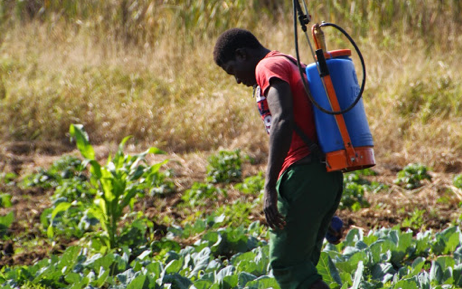Africa south of the Sahara is urbanizing rapidly and its real GDP is growing robustly, trends that affect all levels of the food system. Overall demand for food in East and Southern Africa (ESA) is likely to increase by a factor of 3.3 to 9 times in the next 30 years, depending on economic conditions, according to one simulation exercise. Consumers are purchasing more processed, fresh and perishable foods, including meat and horticultural products. This means farmers of fruits, vegetables, and other horticultural crops face rising labor costs and incentives to increase yields and minimize crop damage from pests or competing plants.
These farms are located mostly in tropical areas with high pest pressure, which leads to heavy use and reliance on pesticides over traditional methods of pest control. This presents several challenges. Considerable evidence links pesticide use to chronic health problems in farmers, and pesticides are known to bio-accumulate in soil and water and also be very harmful to ecosystems and wildlife. Fresh produce vendors, meanwhile (a group that includes many farmers), are often unaware of the potential health risks to consumers or themselves. Finally, smallholder farmers operate within a lax regulatory environment, and many do not possess adequate knowledge of optimal spray regimens or safety behavior. Thus, most do not take adequate safety precautions.
How can we better understand the nature of pesticide use so we can better promote agricultural intensification while minimizing use of toxic chemicals—and promote safe and efficacious forms of pest control?
Here are some results of our recent study on projections and estimates of pesticide use in developing areas of Africa south of the Sahara :
- Total pesticide use is projected to increase by a factor of 1.2 to 2.3 (depending on the income growth scenario) by 2040 —a low rate of increase compared to the rest of the world.
- Horticultural farmers are purchasing pesticides at much higher rates than what is suggested by our continental analysis, and face significant health hazards due to toxic chemical exposures and insufficient safety precautions, new evidence from Lusaka and Maputo shows.
Reducing the health and environmental impacts of pesticide use—especially among horticultural farmers—requires behavioral change. But that presents serious obstacles for what, despite the rapid influx of supermarkets and modern procurement practices into Africa, is still largely a traditional and informal food system. For instance, a basic approach is to improve coordination in supply chains and the food marketing system, but it remains difficult to verify the safety of food sold at informal markets through simple visual inspection, and to monitor the behavior of the numerous actors involved in the food supply chain.
The expansion of modern supermarket chains, which emerged in South Africa and have started to spread throughout Eastern and Southern Africa over the past three decades, should help to facilitate behavioral change efforts. These large retailers depend on consistent quantity and quality of supply, often procured through imports and the use of long-term contracts with large and well-capitalized farms, where it is much easier to monitor farmer activity, streamline production processes, and control some production inputs. Supermarket chains have also been known to complement this “preferred supplier” system by buying products from local wholesale markets (for example, in Kenya). But this is generally seen as a backup strategy, one that is not highly publicized due to safety concerns. In addition, despite their rapid expansion, supermarket chains currently control a relatively small market share throughout Eastern-Southern Africa.
Consumer demand can also drive behavioral change in the food system, but evidence suggests that Africa’s urban consumers are largely unaware of the dangers of pesticide residue, making it unlikely that they would be willing to pay a premium in the short run for certification schemes that aim to minimize harmful chemical residues. But evidence from developed countries suggests this is likely to slowly change in the future, as rising educational levels and incomes lead urban consumers to become more aware of food safety and more willing and able to pay for it.
In the short run, governments can take immediate action to ban the use of highly toxic pesticides. Some progress has been made on this front; Mozambique, for example, recently banned the use of methamidophos, although it is taking some time for the ban to be fully enforced. Restricting access to dangerous pesticides, however, is not enough. Governments must find ways to provide access to less harmful but equally effective pesticides and/or training in integrated pest management (IPM) strategies to reduce pesticide application volumes overall.
Jenny Smart is a Senior Research Analyst with IFPRI’s Development Strategy and Governance Division; Jason Snyder is a Postdoctoral Research Associate at Michigan State University’s College of Agriculture & Natural Resources; Joey Goeb received his PhD from MSU; David Tschirley is a Professor of International Development at MSU. This post is based on research that is not yet peer reviewed.







